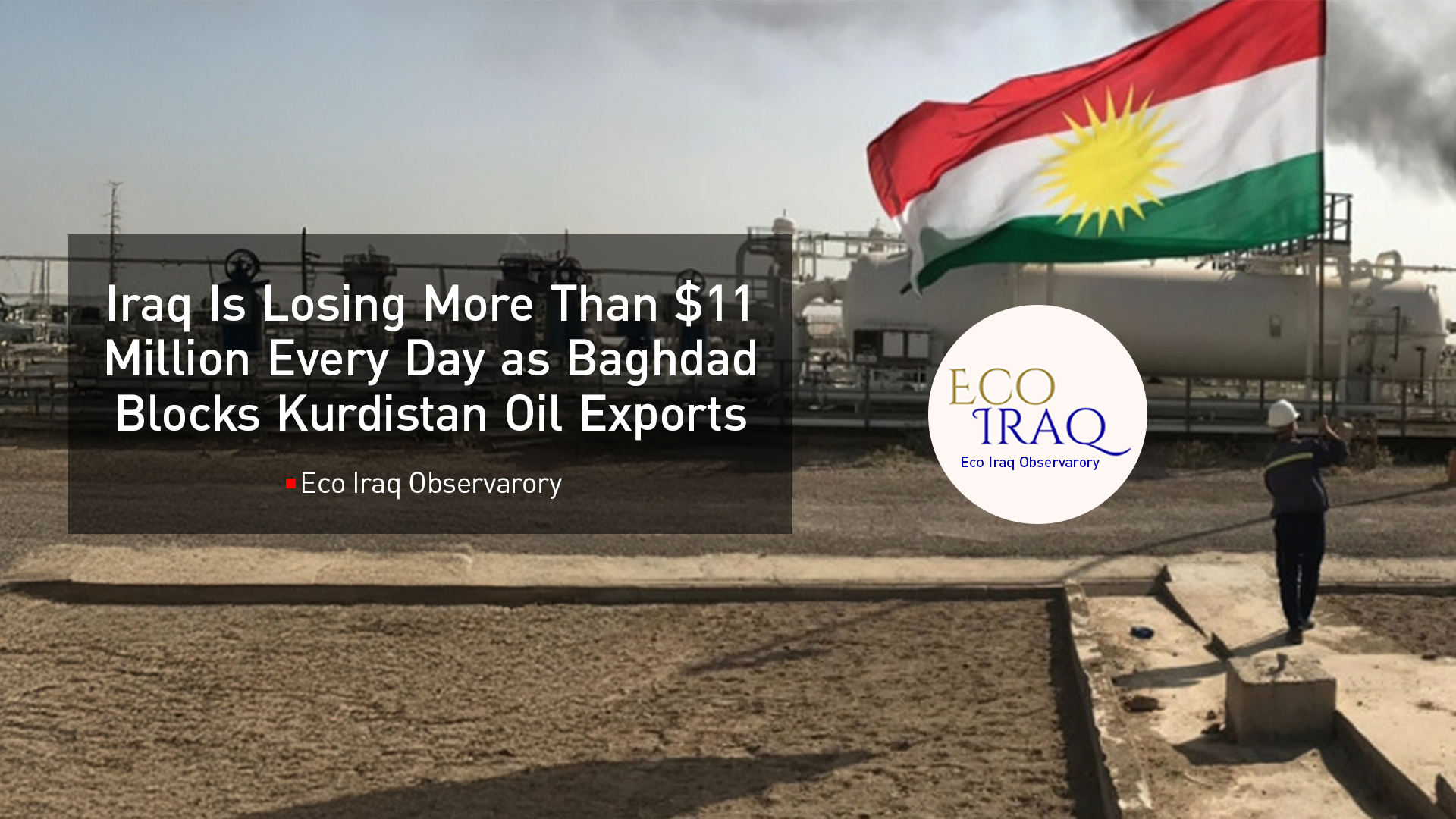Iraq Is Losing More Than $11 Million Every Day as Baghdad Blocks Kurdistan Oil Exports
Baghdad’s failure to pass an oil and gas law and its pressure tactics on Erbil have stalled Kurdistan’s exports, costing Iraq over $4 billion annually.

ERBIL (Kurdistan24) — Iraq is losing more than $11 million every single day due to the continued suspension of oil exports from the Kurdistan Region, according to the ECO IRAQ Observatory, a specialized economic monitoring platform known for its independent assessments of the country’s energy and financial policies. The observatory placed direct blame on Baghdad’s parliament for failing to resolve the long-standing dispute over oil and gas management.
The U.S.-based observatory on Saturday revealed that the Kurdistan Region was expected to export approximately 230,000 barrels of crude oil per day, in addition to allocating around 50,000 barrels for local consumption. With the cost of extraction and transportation standing at $16 per barrel and $1.5 in fees to Turkey for delivering crude to the Ceyhan port, the net profit per barrel remains substantial.
At an estimated price of $66 per barrel, the suspension of these exports translates into a staggering daily loss of $11.16 million, amounting to $334 million per month and over $4 billion annually in missed revenues for Iraq.
Despite these heavy financial losses, the federal government in Baghdad has failed to reach an agreement with Erbil, leaving negotiations shrouded in secrecy and accountability lacking.
The monitoring group held Iraq’s parliament directly responsible, accusing it of creating chaos by refusing to pass a long-awaited 'Oil and Gas Law' to regulate and manage the country’s oil and gas sector.
A Chronic Dispute that Hurts All of Iraq
The ongoing deadlock over the Kurdistan Region’s oil exports is far from a mere technical disagreement. At its core lies Baghdad’s long-standing unwillingness to recognize the Region’s constitutional rights under the 2005 Iraqi Constitution, which granted the Kurdistan Regional Government (KRG) shared authority over natural resources.
Instead of honoring these commitments, successive Iraqi administrations have politicized oil exports, using them as a pressure tool against the people of Kurdistan.
For years, Erbil has argued that independent oil exports are essential to pay public salaries, fund infrastructure projects, and provide stability in a region that has already borne the brunt of wars, economic blockades, and hosting millions of displaced people.
Baghdad, however, has repeatedly resorted to financial blackmail, cutting salaries, and withholding the Kurdistan Region’s rightful share of the federal budget, all while demanding full control of oil revenues.
This centralization of power has not only strangled the Kurdistan Region’s economy but also damaged Iraq’s international credibility. Foreign investors view Baghdad’s unpredictable policies and arbitrary interventions as a sign of instability, deterring long-term partnerships in the energy sector.
The failure to establish a comprehensive oil and gas law, despite two decades of promises, has left Iraq unable to fully capitalize on its resources, costing the country billions.
Political Stalemate and Hidden Agendas
Behind the scenes, negotiations between Baghdad and Erbil have remained closed to media scrutiny, fueling speculation that the Iraqi government is intentionally dragging its feet. Observers note that while Baghdad enjoys revenues from southern oil fields, it shows little urgency in resolving the crisis in the north, effectively punishing the Kurdish population while claiming to act in the interest of national unity.
The suspension of exports through the Iraq-Turkey pipeline since March 2023 has already deprived international markets of Kurdish oil, strained ties with Ankara, and weakened Iraq’s bargaining position globally. Yet, Baghdad has treated this issue as secondary, prioritizing political maneuvering over economic necessity.
Critics argue that this reflects Baghdad’s broader policy of undermining the Kurdistan Region’s autonomy. By blocking Erbil’s ability to export oil, Baghdad seeks to force the Region into submission, disregarding the severe financial and social consequences for millions of Kurdish citizens who rely on stable revenues to sustain daily life.
Kurdistan Pays the Price
The people of the Kurdistan Region ultimately pay the price for Baghdad’s failures. Delayed salaries, underfunded public services, and an economy held hostage by political disputes are daily realities. While Iraq as a whole suffers billions in losses, it is the Kurdish families, civil servants, and business owners who face the harshest impact.
Instead of fostering cooperation and equitable resource-sharing, Baghdad has weaponized oil policy, undermining the spirit of federalism and alienating the very partner that has been instrumental in stabilizing Iraq, particularly during the war against ISIS.
Until Iraq’s leaders demonstrate the political will to pass a fair oil and gas law and respect the constitutional rights of the Kurdistan Region, the crisis will continue to fester—bleeding Iraq’s economy, eroding investor confidence, and deepening mistrust between Baghdad and Erbil.